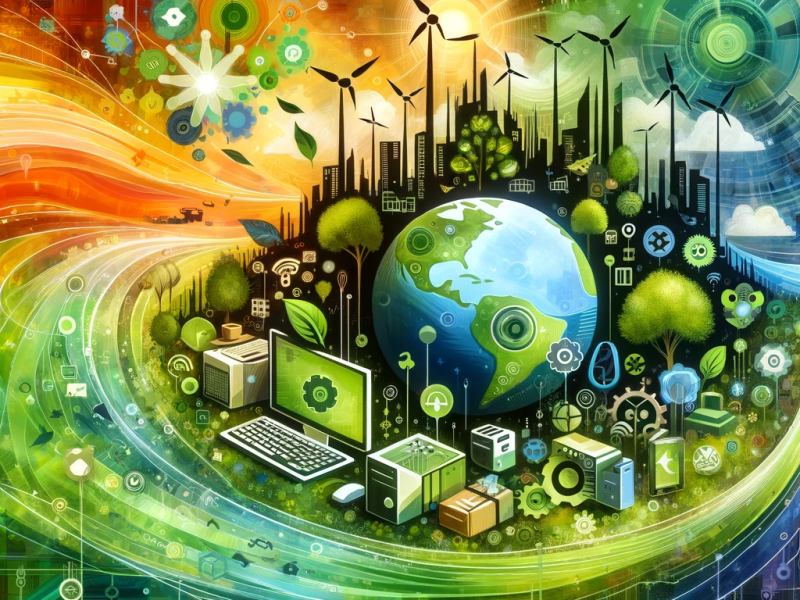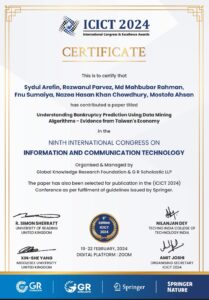Information Technology (IT) has emerged as a fundamental driver of advancement and ingenuity in our swiftly changing environment. However, its function extends well beyond mere technological progress. Information technology has become a crucial partner in advancing sustainable development, which involves achieving a harmonious combination of economic progress, environmental preservation, and social fairness. This blog examines the diverse role of information technology (IT) in promoting sustainable development. It explores how digital solutions not only enhance efficiency and economic growth but also contribute to creating a more sustainable and fairer world.
The Intersection of IT and Sustainability
- Digital Solutions for Environmental Challenges: When it comes to solving environmental problems, information technology (IT) is vital. To better manage waste, optimize energy use, and keep an eye on pollution levels, for instance, data analytics and AI are finding widespread use. Smarter, more eco-conscious city planning is possible thanks to the Internet of Things (IoT), which is improving city living while reducing carbon emissions.
- Green Computing The concept of green computing encompasses the process of creating, producing, and utilizing computers and devices that have a low ecological footprint. This encompasses the utilization of energy-efficient technology, the environmentally conscious disposal and recycling of electronic waste, and the establishment of sustainable data centers.
Advancing Sustainable Business Practices
- Energy Management: Information technology plays a key role in the management of energy. Smart grids utilize digital technology to optimize the generation, transmission, and utilization of power, resulting in enhanced efficiency and less energy loss.
- Remote Work and Reduced Carbon Emissions: The advent of digital collaboration tools, propelled by advancements in information technology, has facilitated the viability of remote work, so diminishing the necessity for travel and thereby mitigating carbon emissions.
- Supply Chain Optimization: Information technology empowers firms to establish supply networks that are more environmentally and socially responsible. By leveraging technologies such as blockchain, companies can enhance the level of transparency in their supply chains, thereby guaranteeing ethical sourcing practices and minimizing their ecological footprint.
Empowering Social Sustainability
- Bridging the Digital Divide: IT activities targeting the enhancement of digital literacy and technology accessibility in disadvantaged regions are essential for promoting social fairness, a fundamental component of sustainable development.
- E-Health and Education: Digital platforms in the fields of healthcare and education are enhancing the accessibility of these vital services, particularly in distant or underserved regions, thus promoting societal well-being.
Challenges and Future Directions
- The Carbon Footprint of IT Itself: Although information technology (IT) contributes to sustainability efforts, it is important to note that the industry itself consumes a substantial amount of energy. The task at hand is enhancing the sustainability of IT by minimizing the carbon emissions produced by data centers and enhancing the energy efficiency of devices and networks.
- E-Waste Management: The swift obsolescence of technology presents a significant e-waste dilemma. To achieve sustainable development in the field of information technology, it is imperative to focus on the entire lifecycle of electronic devices, with a particular emphasis on promoting recycling and minimizing waste.
- Ethical AI and Data Security: It is critical to prioritize ethical considerations and guarantee data privacy as we use AI for sustainable development. Responsible and inclusive use of these technologies is of the highest significance.
When it comes to sustainable development, information technology (IT) is king since it can change things drastically and extensively in so many ways. Through the utilization of digital technologies, we can effectively tackle the most urgent concerns of our era. Nevertheless, this expedition is not devoid of its difficulties. Achieving genuine sustainable development requires a careful balance between technical progress, environmental preservation, and social fairness. To achieve a more environmentally friendly and sustainable future, it is crucial for all parties involved, including governments, businesses, and individuals, to work together and make use of information technology.




